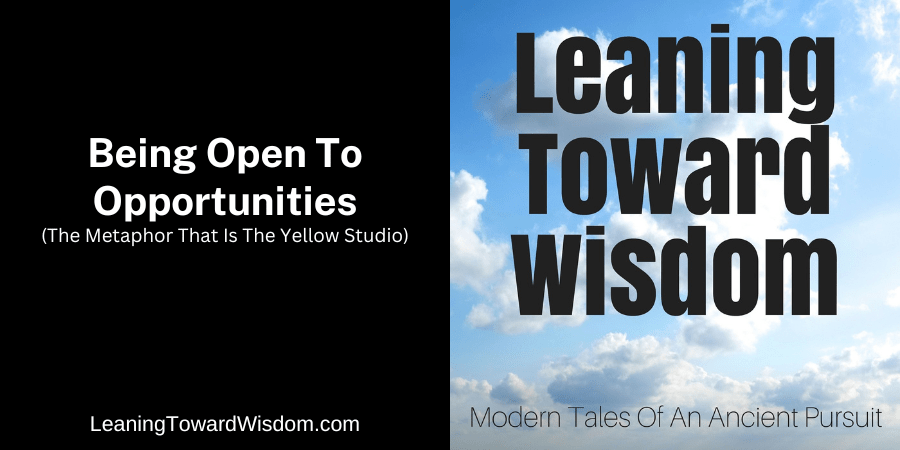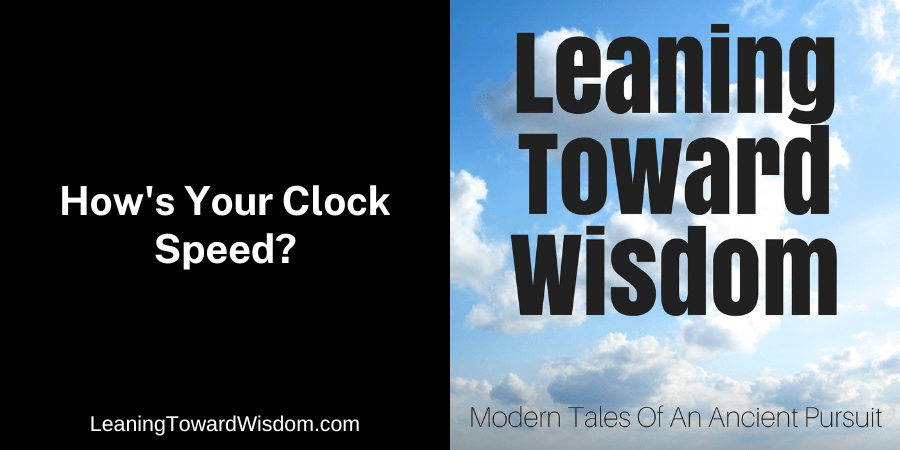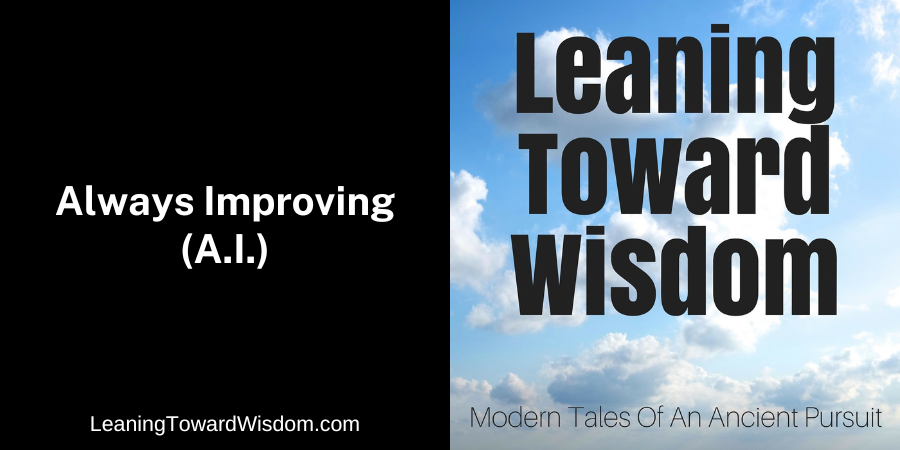Being Open To Opportunities (The Metaphor That Is The Yellow Studio)
Podcast: Play in new window | Download (Duration: 48:16 — 44.2MB)
Subscribe: Apple Podcasts | Spotify | Email | RSS | More
1989. I was being courted by a business owner looking for new, fresh leadership. The business was located where Rhonda and I most wanted to be, Dallas/Ft. Worth, Texas. The kids were in elementary school. Early elementary school. Life had been hectic for the previous 3 years. Situations had changed that were beyond our control – things that we didn’t feel were favorable for training and raising our children. So, we took our aim for Texas – DFW. It was Rhonda’s home and we were familiar with it.
Among our reasons – and in this order – church. Spiritual reasons were at the very top of our list. Next, the kids. Where did we feel we could give them the best advantages spiritually, educationally, personally (future spouses), and careerwise? DFW checked all the boxes for us when we began to strategize ways to accomplish this goal. That was somewhere around 1987. It took me a few years to pull it all together. By the end of 1989 I had started the process. By the end of the school year, May 1990, we had made the transition.
Sometimes it takes awhile. Our goals – what I now call “our ideal outcome” – don’t always happen as quickly as we’d like. This ideal outcome was one we had time to carefully consider and plan for. There were days we questioned if it might happen. Mostly, it took over 2 years before I was given the opportunity to make it a reality.
That was then. This is now.
In 2018 another life situation provoked Rhonda and I to ask, “Now what?” The clarity we experienced in 1987 didn’t happen this time. It would come much more slowly, like the slow turn of a focus knob on a telescope. In fact, it took a couple of years – not for the opportunity, but for us to even figure out what we might want. “What is our ideal outcome?” was the question we wrestled with. And it was anything but easy or clearcut. Not like life back in 1987. That focus came faster for us. The decision was more easily made beforehand back then because the path seemed evident to us. Not this time.
But this time was different. This was a gut punch. Back in the 1980s it was more of a slow burn. Our knees weren’t buckled in the 80s. This time, they were. And that takes more time. To catch your breath. To get back on your feet. Besides, things were well beyond our control mostly so we were having to figure things out in real-time. Deciding how you’ll react – asking yourself how you can make the wisest choices – can take time.
When the stakes are high we felt we needed to get it right the first time. There may not be an opportunity to correct it. You don’t know.
For me, the barometer has always been regret. Will I regret doing this? Will I regret not doing this?
Back in 1987 I knew – Rhonda did, too – that we would regret staying where we were. We had to make a move. For the welfare of our children. But I admit I hated that we had to do it. It was a move I wished we wouldn’t have had to make. It was a sad decision because of what once was – and what could have been. But life does that to us. Throws us curveballs that we must figure out how to hit.
Today, things are different. There is no sadness. I’m not romantic or sentimental about what once was or what could have been. I’m just ready. Ready to move on. Ready to grow. Ready to embrace a new chapter – our encore chapter.
By 2020 our focus was clear. So much so, that by the end of 2021 we had put our money where our mouth and our fantasies were. We bought a piece of property in a place that had captured our heart. A place of solitude. Respite. It was likely because when our knees buckled it was the place we went to sort things out. That was our first encounter with the place. Maybe that made it more special. I don’t know, but I do know we found it beautiful. And the closeness of the community, the diversity of the positives (trails, lakes, creeks, trees, wildlife, golf courses, mountains and more) was appealing.
It only had one downside.
It wasn’t in DFW. And DFW is where our entire tribe was thanks to our decision back in 1987 (and the execution of that decision in 1990).
Grandkids didn’t exist back then. Now we had five.
Lots of things had changed. Many of them blessings. Some of them curses. But the tribe was all blessing, all the time. But…
We weren’t (aren’t) prepared to leave the tribe and our happy place is only 5 hours away…so it made sense to us, in the short-term to spend time in each place. The plan was to spend way more time in Texas than in Happy Serene Village, five hours away. We figured we’d get over to HSV (Happy Serene Village) 3 or 4 times over the 12 month transition.
What transition? Transitioning from what to what? Or from where to where?
That’s the rub. We’re navigating a number of transitions.
Transition 1: Selling a house we’ve been in for 25 years and moving to a new place.
Transition 2: Buying another house in Happy Serene Village and spending more time there.
Transition 3: Creating new career chapters – both of us – as we march toward hitting full-retirement age for Social Security.
They’re all pretty big and they’re all intertwined. There are many moving parts to our life right now. Frightening and exciting.
Being open to opportunities has always been our way of life – just like cash flowing life. Sometimes we’ve been more open to them than at other times. Determined mostly by our comfort level or lack of. Whenever we’ve been most comfortable, we’ve been much less open. That is, when things are going well, we’re not real open for opportunities. Why mess up a good thing, right?
But that’s the ideal time to more closely look for opportunities. Strike while the iron is hot and all that. Doesn’t it make sense that our optimum time to see and jump on opportunities is when we’re riding high? But that’s not how it usually goes. Comfort forms around us like a Tempur-Pedic mattress, enveloping us so strongly it paralyzes us from doing anything different. It just feels too good to stay put. Mostly, that’s what we do – we stay put – when the better option might be to seize even bigger opportunities. After all, we say it ’cause it’s true – the rich get richer. That happens because they tend to get more opportunities, but they have to take advantage of them. Hum.
This impacts The Yellow Studio because the original is now gone. No longer in my possession. But now, here we were mere days away from signing the paperwork to sell the house, which included The Yellow Studio. We had no thought of buying a house or any other property. Moving was on our mind. Enter months of a secret I’d been holding.
Sometime in the late fall a house in Happy Serene Village caught my attention. Initially, the curb appeal snagged it. It was a new house with an attractive front. And thus began the happy accident that we never saw coming. But we were open to it.

Please tell a friend about the podcast!
Being Open To Opportunities (The Metaphor That Is The Yellow Studio) Read More »







